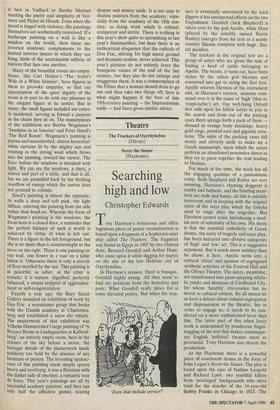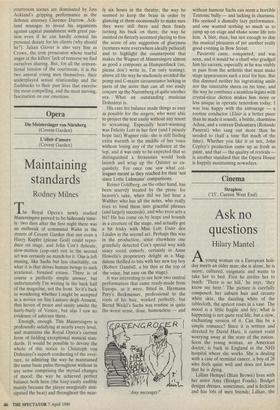Theatre
The Trackers of Oxyrhynchus (Olivier) Never the Sinner (Playhouse)
Searching high and low
Christopher Edwards
Tony Harrison's boisterous and often ingenious piece of poetic reconstruction is based upon a fragment of a Sophocles satyr play called The Trackers. The fragment was found in Egypt in 1907 by two Oxford dons, Bernard Grenfell and Arthur Hunt, who came upon it while digging for papyri on the site of the lost Hellenic city of Oxyrhynchus. In Harrison's version, Hunt is brusque, Grenfell highly strung. All they seein'to find are petitions from' the homeless and poor. What Grenfell really pines fora is some elevated poetry. But when the trea-
'Does that include service?'
sure is eventually uncovered by the local diggers it has unexpected effects on the two Englishmen. Grenfell (Jack Shepherd) is taken over by the god Apollo, while Hunt (played by the suitably named Barrie Rutter) emerges from his tent as a north- country Silenus complete with huge, flac- cid member.
The trackers in the original text are a group of satyrs who are given the task of finding a herd of cattle belonging to Apollo. The beasts, it turns out, have been stolen by the infant god Hermes and converted into gut to string the first lyre. Apollo relieves Hermes of the instrument and, in Harrison's version, assumes com- mand over it in the name of 'high' (that is, `respectable') art. Our well-hung Oxford don calls upon his fellow satyrs to join in the search and from out of the packing cases there springs forth a pack of them dressed in orange body stockings, heavy gold clogs, pointed ears and gigantic erec- tions. The sides of the packing cases fall neatly and cleverly aside to make up a Greek manuscript, upon which the satyrs perform an abandoned percussive dance as they try to piece together the trail leading to Hermes.
For much of the time, the work has all the engaging qualitieS of a pantomimic romp. Both Shepherd and Rutter are very amusing, Harrison's rhyming doggerel is earthy and bathetic, and the bristling mem- bers are rude and funny; all this is suitably irreverent and in keeping with the original spirit of the satyr play which the Greeks used to stage after the tragedies. But Harrison cannot resist introducing a mod- ish note of solemnity of his own. His thesis is that the essential catholicity of Greek drama, the unity of tragedy and satyr play, has been betrayed into divisive categories of 'high' and 'low' art. This is a suggestive argument. But it needs more subtlety than he allows it here. Apollo turns into a cultural 'elitist' and sponsor of segregated aesthetic actiyities at the Festival Hall and the Olivier Theatre. The satyrs, meantime, are transformed into paint-spraying nihilis- tic punks and denizens of Cardboard City, for whom 'healthy' irreverence has no moral or cultural context. By all means let us have a debate about cultural segregation and dispossession in the theatre, but• in order to engage us, it needs to be con- ducted on a more sophisticated level than this. The latter part of this often lively work is undermined by ponderous finger- wagging of the sort that makes contempor- ary English 'political' theatre seem so provincial. Tony Harrison also directs the production.
At the Playhouse there is a powerful piece of courtroom drama in the form of John Logan's Never the Sinner. The play is based upon the case of Nathan Leopold and Richard Loeb, two youthful killers from 'privileged' backgrounds who were tried for the murder of the 14-year-old Bobby Franks in Chicago in 1923. The courtroom scenes are dominated by Joss Ackland's gripping performance as the defence attorney Clarence Darrow. Ack- land manages to invest his arguments against capital punishment with great pas- sion even if he can hardly conceal his personal distate for his clients (why should he?). Julian Glover is also very fine as Crowe, the trim prosecutor whose tearful anger at the killers' lack of remorse we find ourselves sharing. But, for all the conven- tional tension of the courtroom, it is the two amoral young men themselves, their underplayed sexual relationship and the flashbacks to their past lives that exercise the most compelling, and the most moving, fascination on our emotions.



























































 Previous page
Previous page